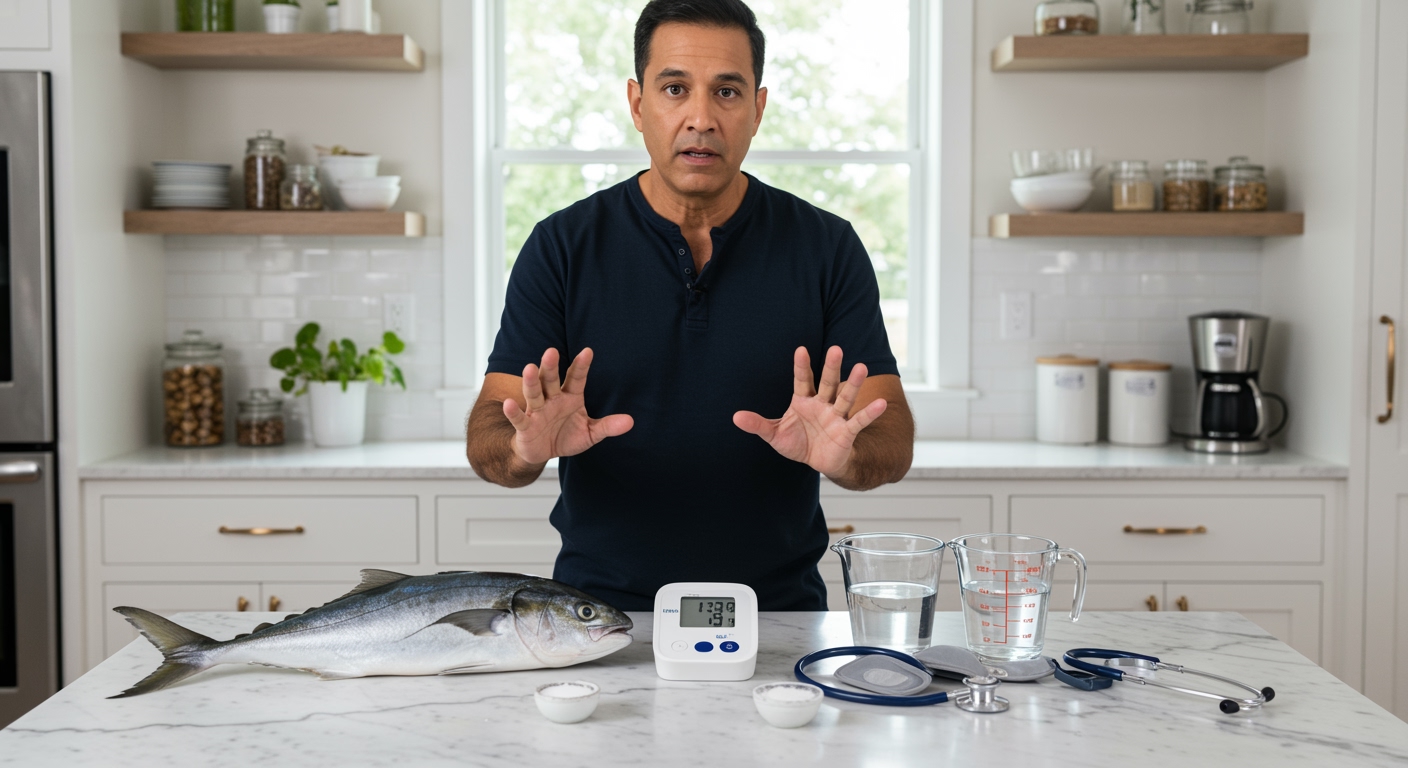✪ Key Takeaway: Amberjack fish does not directly raise blood pressure but its high sodium content when prepared improperly can contribute to elevated readings.
Introduction
You walk into the seafood section and spot beautiful amberjack fillets on ice.
Your doctor told you to eat more fish for heart health, but now you wonder if this particular fish might actually work against your blood pressure goals.
Hi, I’m Abdur, your nutrition coach and today I’m going to explain exactly how amberjack affects your blood pressure and what you need to know before adding it to your plate.
What Makes Amberjack Different From Other Fish?
Amberjack belongs to the jack family of fish and swims in warm ocean waters around the world.
This fish has a firm, meaty texture that many people compare to tuna or mahi-mahi.
The natural sodium content in amberjack runs higher than many freshwater fish because it lives in saltwater environments.
A 3.5-ounce serving of raw amberjack contains approximately 88 milligrams of sodium, which represents about 4% of your daily recommended intake.
This sodium level sits in the middle range compared to other popular fish choices.
The fish also provides high-quality protein, omega-3 fatty acids, and essential minerals that support cardiovascular health.
✪ Fact: Amberjack contains more selenium than most other fish, which helps protect your blood vessels from oxidative damage.
How Does Sodium In Fish Affect Blood Pressure?
Your kidneys work like a filtration system that balances sodium and water in your bloodstream.
When you consume excess sodium, your kidneys hold onto more water to dilute the salt concentration.
This extra water increases your blood volume, which forces your heart to pump harder and raises pressure against artery walls.
The American Heart Association recommends limiting sodium intake to 2,300 milligrams daily, with an ideal target of 1,500 milligrams for people with high blood pressure.
Fresh amberjack contributes a relatively small amount of sodium compared to processed foods, canned soups, or restaurant meals.
The real problem occurs when you add salt during cooking or choose pre-seasoned preparations that can triple the sodium content.
✪ Pro Tip: Rinse fresh amberjack under cold water before cooking to remove any surface salt from ice storage.
Can The Omega-3s In Amberjack Lower Blood Pressure?
Amberjack provides both EPA and DHA, the two most important omega-3 fatty acids for heart health.
These healthy fats work at the cellular level to reduce inflammation in your blood vessels.
Research shows that omega-3s help your arteries stay flexible and relaxed, which allows blood to flow more easily.
A 3.5-ounce serving of amberjack delivers approximately 900 milligrams of combined EPA and DHA.
This amount meets about half of the recommended weekly intake for cardiovascular protection.
The omega-3s also help your body produce compounds called prostaglandins that naturally lower blood pressure and reduce blood clotting risk.
Studies indicate that people who eat fish rich in omega-3s twice weekly show measurable improvements in both systolic and diastolic blood pressure readings.
✪ Note: The blood pressure benefits from omega-3s typically appear after 8-12 weeks of regular consumption.
What Cooking Methods Keep Blood Pressure Benefits?
The way you prepare amberjack determines whether it helps or hurts your blood pressure goals.
Grilling, baking, or steaming preserves the natural omega-3 content while avoiding added sodium from breading or heavy sauces.
Avoid marinating amberjack in high-sodium solutions like soy sauce, teriyaki, or commercial fish marinades.
Instead, use fresh herbs, lemon juice, garlic, and olive oil to enhance flavor without adding salt.
Pan-frying in minimal oil works well, but skip the salt and use pepper, paprika, or dried herbs for seasoning.
Raw preparations like sashimi or ceviche maintain all the beneficial nutrients, though you should ensure the fish comes from a reputable source.
Restaurant preparations often add significant sodium through seasonings, so ask your server about preparation methods and request no added salt.
✪ Pro Tip: Squeeze fresh lemon over cooked amberjack to enhance flavor and add vitamin C that supports healthy blood vessels.
Should You Avoid Amberjack If You Have High Blood Pressure?
People with high blood pressure can safely include amberjack in their diet when prepared without added salt.
The natural sodium content in fresh amberjack remains low enough to fit within heart-healthy eating plans.
Focus on your total daily sodium intake rather than eliminating individual foods that contain naturally occurring sodium.
The protein in amberjack helps maintain healthy blood vessels and supports weight management, both important for blood pressure control.
If you take blood pressure medications, the omega-3s in amberjack may enhance their effectiveness without causing dangerous interactions.
Monitor your blood pressure regularly when adding any new food to track how your body responds to dietary changes.
Talk with your healthcare provider about including fish like amberjack in your meal planning, especially if you have severe hypertension or kidney problems.
✪ Note: Some people with kidney disease need to limit protein intake, so check with your doctor before increasing fish consumption.
The Bottom Line
Amberjack does not raise blood pressure when you prepare it without adding extra salt or sodium-heavy seasonings.
The key to heart-healthy eating lies not in avoiding individual foods, but in understanding how preparation methods transform nutritional benefits into potential risks.
I would love to hear about your experiences with amberjack or any questions you have about incorporating fish into a blood pressure-friendly diet, so please share your thoughts in the comments below.
References
At NutritionCrown, we use quality and credible sources to ensure our content is accurate and trustworthy. Below are the sources referenced in creating this article:
- PubMed: Fish consumption and cardiovascular disease
- CalorieMenu: Amberjack Nutrition Facts
- PubMed: Omega-3 fatty acids and blood pressure
- SnapCalorie: Amberjack Nutrition Information





